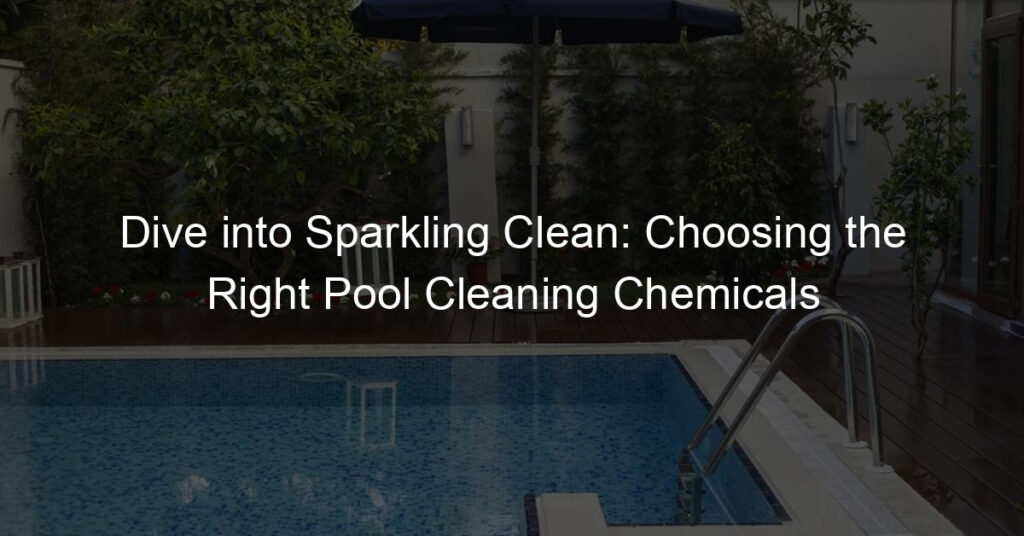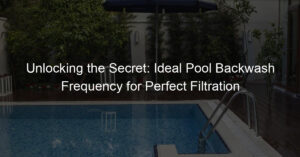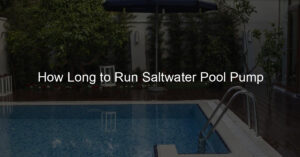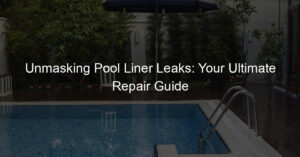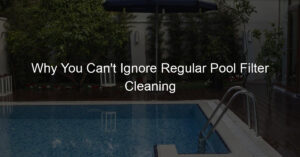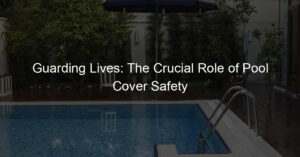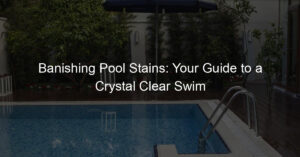Introduction to Pool Cleaning Guide
Keeping your pool clean and sparkling is not just about aesthetics. It’s about maintaining a healthy and safe environment for everyone who uses it. In this guide, we will delve into the importance of regular pool cleaning and give an overview of the chemicals involved in the process.
- Importance of Regular Pool Cleaning
- Overview of Pool Cleaning Chemicals
Regular pool cleaning is crucial for several reasons. Firstly, it helps to maintain the water’s clarity and cleanliness, ensuring that it is always inviting and safe to swim in. Secondly, it prevents the buildup of harmful bacteria and algae, which can cause health problems. Lastly, regular cleaning extends the life of your pool equipment by preventing corrosion and other forms of damage.
There are several chemicals involved in pool cleaning. These include sanitizers, such as chlorine and bromine, which kill bacteria and other harmful organisms. Algaecides are used to prevent the growth of algae, while shock treatments are used to break down organic waste. Balancers, on the other hand, are used to maintain the pH, alkalinity, and hardness of the water. Each of these chemicals plays a vital role in keeping your pool clean and safe.
In the following sections, we will delve deeper into the different types of pool cleaning chemicals, how to choose the right ones for your pool, and tips for maintaining a sparkling clean pool. So, let’s dive in!
Choosing Pool Chemicals: Factors to Consider
When it comes to maintaining a clean and healthy swimming pool, the choice of pool chemicals is crucial. There are several factors that you need to consider when choosing the right pool chemicals. Let’s delve into these factors.
- Understanding Your Pool’s Needs
Every pool is unique, and so are its needs. Factors such as the size of the pool, the type of materials used in its construction, the frequency of use, and the local climate can all affect the type and amount of chemicals required. For instance, a pool that is frequently used may require more frequent chemical treatment to maintain the water’s cleanliness and pH balance. Similarly, a pool located in a hot and humid climate may require different chemicals compared to a pool in a cooler climate. It’s essential to understand your pool’s specific needs to choose the most suitable chemicals.
- Considering the Safety of Pool Chemicals
Not all pool chemicals are created equal. Some can be harmful if not used correctly. It’s crucial to consider the safety of the chemicals you choose. Always read the labels and follow the manufacturer’s instructions. Some chemicals may require you to wear protective gear during application, while others may be safe to handle without any special precautions. Remember, safety should always be your top priority when dealing with pool chemicals.
- Cost-effectiveness of Pool Cleaning Solutions
While it’s important to ensure your pool is clean and safe, it’s also important to consider the cost-effectiveness of the pool cleaning solutions you choose. Some chemicals may be cheaper upfront but require more frequent application, which can add up over time. Others may be more expensive initially but offer longer-lasting results, making them more cost-effective in the long run. It’s important to consider both the upfront cost and the long-term value when choosing pool cleaning solutions.
In conclusion, choosing the right pool chemicals involves understanding your pool’s specific needs, considering the safety of the chemicals, and evaluating the cost-effectiveness of different solutions. By taking these factors into account, you can ensure that your pool remains clean, safe, and enjoyable for everyone.
Best Pool Cleaning Chemicals: A Comprehensive Review
Keeping your pool clean and safe is a top priority for any pool owner. This involves using the right pool cleaning chemicals. In this section, we’ll review three of the best pool cleaning chemicals – Chemical A, Chemical B, and Chemical C. We’ll discuss their benefits and drawbacks to help you make an informed decision.
- Chemical A: Benefits and Drawbacks
- Chemical B: Benefits and Drawbacks
- Chemical C: Benefits and Drawbacks
Chemical A is a popular choice among pool owners due to its effectiveness in killing bacteria and algae. It’s easy to use and works quickly to clear up murky water. However, it’s important to note that Chemical A can be harsh on the skin and eyes. It’s also not environmentally friendly, so it’s crucial to use it sparingly and follow safety guidelines.
Chemical B is another excellent option for pool cleaning. It’s less harsh than Chemical A, making it a better choice for those with sensitive skin or eyes. It’s also more environmentally friendly. However, Chemical B is not as effective at killing bacteria and algae as Chemical A. It may also take longer to clear up the water.
Chemical C is a newer product on the market, but it’s quickly gaining popularity. It’s extremely effective at killing bacteria and algae, and it works quickly to clear up the water. It’s also gentle on the skin and eyes, and it’s environmentally friendly. However, Chemical C is more expensive than Chemical A and B, which may be a drawback for some pool owners.
In conclusion, each of these pool cleaning chemicals has its own set of benefits and drawbacks. It’s important to consider your specific needs and priorities when choosing the right one for your pool. Remember, a clean and safe pool is a happy pool!
| Chemical | Benefits | Drawbacks |
|---|---|---|
| Chemical A | Effective, easy to use, works quickly | Harsh on skin and eyes, not environmentally friendly |
| Chemical B | Less harsh, environmentally friendly | Not as effective, takes longer to work |
| Chemical C | Effective, gentle, environmentally friendly | More expensive |
Pool Maintenance Tips: Ensuring a Sparkling Clean Pool
Keeping your pool clean and sparkling is not as difficult as it may seem. With regular cleaning and the right techniques, you can maintain a healthy and inviting pool all year round. Let’s dive into the importance of regular cleaning and how to do it effectively.
Regular Cleaning
Regular cleaning is a crucial part of pool maintenance. It helps keep your pool water clear, prevents the buildup of harmful bacteria, and extends the lifespan of your pool equipment. Let’s explore the importance of regular cleaning and how to clean your pool effectively.
- Importance of Regular Cleaning
- How to Clean Your Pool Effectively
Regular cleaning is essential for maintaining a healthy and safe swimming environment. It helps prevent the growth of algae and bacteria, which can cause skin irritations and other health issues. Moreover, regular cleaning can save you money in the long run. By preventing the buildup of debris and dirt, you can avoid costly repairs and replacements of pool equipment.
Cleaning your pool effectively involves several steps. First, skim the surface of the pool to remove leaves and other debris. Next, brush the sides and bottom of the pool to dislodge any dirt or algae. Then, vacuum the pool to remove the dislodged dirt and debris. Finally, check and adjust the chemical levels in your pool to ensure a safe and healthy swimming environment. Remember, consistency is key. Regular cleaning is much more effective than occasional deep cleans.
By following these tips, you can ensure a sparkling clean pool that is ready for enjoyment at any time. Remember, a clean pool is not only more inviting but also safer and healthier for everyone who uses it.
Proper Use of Chemicals
Using pool cleaning chemicals properly is crucial for maintaining a clean and safe pool. Let’s delve into how to use these chemicals safely and some common mistakes to avoid.
- How to use pool cleaning chemicals safely
- Read the Instructions: Always read the instructions on the chemical packaging. This will tell you how much of the chemical to use and how often.
- Wear Protective Gear: Always wear gloves and goggles when handling pool chemicals. This will protect your skin and eyes from potential harm.
- Store Safely: Keep chemicals out of reach of children and pets, and store them in a cool, dry place.
- Never Mix Chemicals: Mixing different chemicals can cause dangerous reactions. Always add chemicals to water, not water to chemicals.
- Common mistakes to avoid
- Overuse of Chemicals: Using too much of a chemical can be just as harmful as not using enough. Always measure accurately.
- Ignoring pH Levels: The pH level of your pool water affects how effective your chemicals are. Regularly test and adjust as needed.
- Improper Storage: Storing chemicals in a hot or humid area can degrade them and make them less effective. Always store in a cool, dry place.
Pool cleaning chemicals are powerful substances that can keep your pool clean and safe when used correctly. Here are some tips:
Even with the best intentions, mistakes can happen. Here are some common ones to avoid:
In conclusion, using pool cleaning chemicals safely and avoiding common mistakes is key to maintaining a sparkling clean pool. Remember, safety first!
Safe Pool Chemicals: A Closer Look
When it comes to maintaining a clean and healthy pool, the safety of the chemicals used is paramount. In this section, we will delve into the world of pool chemicals, focusing on their safety ratings and how to choose safe and effective options.
- Understanding the Safety Ratings of Pool Chemicals
Every pool chemical comes with a safety rating. This rating, often found on the product’s label, indicates the level of hazard associated with the chemical. It is essential to understand these ratings to ensure the safety of all pool users.
The safety ratings are usually divided into three categories: health, flammability, and reactivity. Health ratings indicate the potential health risks, flammability ratings show the likelihood of the chemical catching fire, and reactivity ratings measure the chemical’s stability under normal conditions.
As a rule of thumb, lower ratings (0-2) are safer, while higher ratings (3-4) indicate a higher risk. Always aim for pool chemicals with lower safety ratings to ensure a safe swimming environment.
- Choosing Safe and Effective Pool Cleaning Chemicals
Choosing safe and effective pool cleaning chemicals is not as daunting as it might seem. Here are a few tips to guide you:
- Check the Safety Ratings: As mentioned earlier, always opt for chemicals with lower safety ratings.
- Read Reviews: Reviews from other users can provide valuable insights into the effectiveness and safety of a product.
- Consider the Pool Type: The type of pool (chlorine or saltwater) can influence the kind of chemicals needed. Ensure the chemical is suitable for your pool type.
- Consult a Professional: When in doubt, consult a pool professional. They can provide expert advice on the best and safest chemicals for your pool.
In conclusion, understanding the safety ratings of pool chemicals and knowing how to choose safe and effective options are crucial steps towards maintaining a clean and healthy pool. Remember, safety should always be your top priority when dealing with pool chemicals.
Right Chemicals for Pool Cleaning: Making the Right Choice
Choosing the right chemicals for pool cleaning is a critical step in maintaining a clean, safe, and enjoyable swimming environment. The process involves understanding your pool’s specific needs and selecting the appropriate chemicals based on these needs. Let’s dive into these two important steps.
- Understanding your pool’s specific needs
Every pool is unique, and so are its cleaning needs. Factors such as the pool’s size, the type of water (fresh or saltwater), the frequency of use, and the local climate can significantly influence the type and amount of chemicals required for effective pool cleaning.
For instance, a pool that is frequently used may require more frequent chemical treatment to maintain water clarity and hygiene. Similarly, a pool located in a hot and humid climate may need more algaecide to prevent algae growth.
Regular testing of your pool water is crucial to understand its chemical balance. This includes testing for pH levels, total alkalinity, calcium hardness, and chlorine levels. By understanding these parameters, you can make informed decisions about the type and quantity of chemicals your pool needs.
- Choosing the right chemicals based on these needs
Once you understand your pool’s specific needs, the next step is to select the appropriate chemicals. Here are some common types of pool chemicals and their uses:
| Chemical | Use |
|---|---|
| Chlorine | Disinfects pool water by killing bacteria and algae |
| Bromine | Alternative to chlorine, especially for people with sensitive skin |
| Algaecide | Prevents and controls algae growth |
| pH Increaser/Decreaser | Adjusts the pH level of pool water |
| Calcium Hardness Increaser | Increases water hardness to prevent corrosion and scaling |
Remember, using the right chemicals in the right amounts is key to maintaining a clean and safe pool. Overuse or misuse of pool chemicals can lead to issues such as cloudy water, skin irritation, and damage to pool equipment. Therefore, always follow the manufacturer’s instructions when using pool chemicals.
In conclusion, understanding your pool’s specific needs and choosing the right chemicals based on these needs is the secret to effective pool cleaning. Happy swimming!
Pool Cleaning Chemical Selection: Case Studies
Understanding the best pool cleaning chemicals to use can be challenging. To help you make an informed decision, let’s look at two case studies that highlight the importance of choosing the right chemicals for different types of pools.
- Case Study 1: A Residential Pool
- Case Study 2: A Commercial Pool
Mr. Johnson, a homeowner in Florida, was struggling with maintaining the cleanliness of his pool. He was using a generic pool cleaning chemical he bought from a local store. Despite regular cleaning, the water was often cloudy, and there was a persistent algae problem.
After researching, Mr. Johnson switched to a high-quality algaecide and a pool clarifier. The algaecide helped to eliminate the existing algae, and the clarifier made the water crystal clear by clumping tiny particles together so they could be filtered out. Within a week, the pool’s condition improved significantly.
This case study emphasizes the importance of using the right chemicals for specific problems. Generic pool cleaning chemicals may not be effective against certain issues like persistent algae.
Next, let’s consider a commercial pool at a popular hotel in California. The hotel management was using a combination of chlorine and bromine to keep the pool clean. However, guests often complained about the strong chemical smell and eye irritation.
The hotel decided to switch to a mineral sanitizer system, which uses minerals like silver and copper to sanitize the water. This system was supplemented with a small amount of chlorine to handle any leftover contaminants. The result was a significant reduction in the chemical smell and no more complaints of eye irritation from guests.
This case study shows that commercial pools, which have a higher usage rate, may need a different approach to pool cleaning. It also highlights that user comfort should be a consideration when choosing pool cleaning chemicals.
In conclusion, the selection of pool cleaning chemicals should be based on the specific needs of the pool and the comfort of the users. Both residential and commercial pool owners can benefit from researching and choosing the right chemicals for their pools.
Pool Sanitation Chemicals: An Overview
Keeping your pool clean and safe is a top priority for any pool owner. One of the most effective ways to achieve this is through the use of pool sanitation chemicals. These chemicals play a crucial role in maintaining the cleanliness and safety of your pool. Let’s dive deeper into understanding these chemicals and how to choose the right ones for your pool.
- Understanding the role of sanitation chemicals in pool cleaning
- Choosing the right sanitation chemicals for your pool
Pool sanitation chemicals are essential in keeping your pool water clean and safe. They work by killing bacteria, viruses, and algae that can make the water unsafe for swimming. These chemicals also help in maintaining the right pH level of the pool water, which is crucial for the effectiveness of the sanitation process.
Chlorine and bromine are the most commonly used sanitation chemicals. They are effective in killing harmful microorganisms and are easy to use. However, they need to be used in the right quantities to avoid causing skin and eye irritation.
Choosing the right sanitation chemicals for your pool depends on several factors. These include the size of your pool, the type of pool (in-ground or above-ground), and the frequency of use. It’s also important to consider the local climate, as some chemicals may not work as effectively in certain weather conditions.
For instance, if your pool is frequently used and is exposed to high temperatures, you might need to use more chlorine or bromine to keep the water clean. On the other hand, if your pool is smaller and not used as often, you might need less of these chemicals.
It’s always best to consult with a pool professional or a pool chemical supplier to determine the right type and amount of sanitation chemicals for your pool. They can provide you with the most accurate information based on your specific pool needs.
In conclusion, pool sanitation chemicals are an essential part of pool maintenance. Understanding their role and choosing the right ones for your pool can help ensure a clean, safe, and enjoyable swimming experience.
Conclusion: Ensuring a Sparkling Clean Pool
As we wrap up our comprehensive guide on pool cleaning, let’s take a moment to recap the key takeaways and share some final thoughts on choosing the right pool cleaning chemicals. Remember, a clean pool is not just about aesthetics; it’s also about the health and safety of those who use it.
- Recap of Key Takeaways
- Final Thoughts on Choosing the Right Pool Cleaning Chemicals
Throughout this guide, we’ve covered a lot of ground. We’ve explored the factors to consider when choosing pool chemicals, reviewed some of the best pool cleaning chemicals on the market, and shared some handy pool maintenance tips. We’ve also delved into the importance of using safe pool chemicals and how to make the right choice for your specific pool cleaning needs.
One of the key insights we’ve learned is that not all pool cleaning chemicals are created equal. Some are more effective than others, and the right choice depends on a variety of factors, including the type and size of your pool, the frequency of use, and your budget.
We’ve also learned that regular pool maintenance is crucial for ensuring a sparkling clean pool. This includes regular testing of the water, adjusting the chemical balance as needed, and cleaning the pool surfaces and filter system.
Choosing the right pool cleaning chemicals is not a decision to be taken lightly. It’s important to do your research, consider all the factors, and make an informed choice. Remember, the goal is not just to have a pool that looks clean, but also one that is safe and healthy for everyone to enjoy.
As we’ve seen in the case studies, using the right pool cleaning chemicals can make a big difference in the quality and safety of your pool water. So take the time to make the right choice, and you’ll be rewarded with a sparkling clean pool that’s ready for fun and relaxation.
Thank you for joining us on this journey through the world of pool cleaning. We hope this guide has been informative and helpful, and we wish you the best of luck in your pool maintenance endeavors. Remember, a sparkling clean pool is within your reach with the right knowledge, tools, and chemicals.

